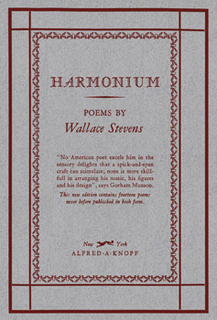Related Research Articles

Harmonium is a book of poetry by American poet Wallace Stevens. His first book at the age of forty-four, it was published in 1923 by Knopf in an edition of 1500 copies. This collection comprises 85 poems, ranging in length from just a few lines to several hundred. Harmonium was reissued in 1931 with three poems omitted and fourteen new poems added.
"The Emperor of Ice-Cream" is a poem from Wallace Stevens's first collection of poetry, Harmonium. It was first published in 1922, and is in the public domain. Stevens' biographer, Paul Mariani, identifies the poem as one of Stevens' personal favorites from the Harmonium collection. The poem "wears a deliberately commonplace costume", he wrote in a letter, "and yet seems to me to contain something of the essential gaudiness of poetry; that is the reason why I like it".
"The Paltry Nude Starts on a Spring Voyage" is a poem from Wallace Stevens's first book, Harmonium. Originally published in 1919, it is in the public domain. Despite general agreement that it is indebted to Botticelli's The Birth of Venus, there is uncertainty about the nature of the debt.
"Le Monocle de Mon Oncle" is a poem from Wallace Stevens's first book of poetry, Harmonium. It was first published in 1918.
"Ploughing on Sunday" is a poem from Wallace Stevens's first book of poetry, Harmonium (1923). First published in 1919, it is now in the public domain.
"The Doctor of Geneva" is a poem from Wallace Stevens's first book of poetry, Harmonium (1923). The poem was first published in 1921, so it is free of copyright.
"The Comedian as the Letter C" is a poem from Wallace Stevens's first book of poetry, Harmonium (1923). It was one of the few poems first published in that collection and the last written for it. John Gould Fletcher frames the poem as expressing Stevens's view "that the artist can do nothing else but select out of life the elements to form a 'fictive' or fictitious reality."
"O Florida, Venereal Soil" is a poem from Wallace Stevens's first book of poetry, Harmonium. It was first published in the journal Dial, volume 73, July 1922, and is therefore in the public domain.
"The Apostrophe to Vincentine" is a poem from Wallace Stevens's first book of poetry, Harmonium (1923). It was first published before 1923 and is therefore in the public domain according to Librivox.
"Anecdote of Canna" is a poem from Wallace Stevens's first book of poetry, Harmonium (1923).
"Anecdote of the Prince of Peacocks" is a poem from Wallace Stevens's first book of poetry, Harmonium (1923). It was one of the few Harmonium poems first published in that volume, so it is still under copyright. However, it is quoted here as justified by Fair use to facilitate scholarly commentary.
"Bantams in Pine-Woods" is a poem from Wallace Stevens's first book of poetry, Harmonium. It was first published in 1922 in the poetry journal Dial, along with five other poems, all under the title "Revue." It is in the public domain.
"Anecdote of the Jar" is a poem from Wallace Stevens's first book of poetry, Harmonium. First published in 1919, it is in the public domain.
"Palace of the Babies" is a poem from Wallace Stevens's first book of poetry, Harmonium. It was first published in 1916 and is therefore in the public domain.
"Two Figures in Dense Violet Light" is a poem from Wallace Stevens's first book of poetry, Harmonium. It was first published in 1923, so it is still under copyright. Only its first stanza is quoted here.
"Theory" is a poem from Wallace Stevens's first book of poetry, Harmonium. It was first published in 1917, so it is in the public domain.
"Colloquy with a Polish Aunt" is a poem from Wallace Stevens's first book of poetry, Harmonium. It was first published in 1919 and is included in The Collected Poems of Wallace Stevens (1954).
"The Man Whose Pharynx Was Bad" is a poem from Wallace Stevens's first book of poetry, Harmonium. First published in 1921, it is in the public domain in the United States.
"The Death of a Soldier" is a poem from Wallace Stevens's first book of poetry, Harmonium. The poem uses free verse to describe the death of a soldier.
"Sea Surface full of Clouds" is a poem from the second, 1931, edition of Wallace Stevens's first book of poetry, Harmonium. It was first published in 1924, so it is restricted by copyright. However, brief parts of it are quoted here as fair use, and the whole poem is available elsewhere on the Internet.
References
- Bates, Milton J. Wallace Stevens: A mythology of self. 1985: University of California Press.
- Buttel, Robert. "Teasing the reader into Harmonium. The Wallace Stevens Journal . Volume VI, Numbers 3/4 (Fall 1982)
- Sukenick, Ronald. Wallace Stevens: musing the obscure. 1967: New York University Press.
- Vendler, Helen. Words Chosen Out Of Desire. 1984: University of Tennessee Press.